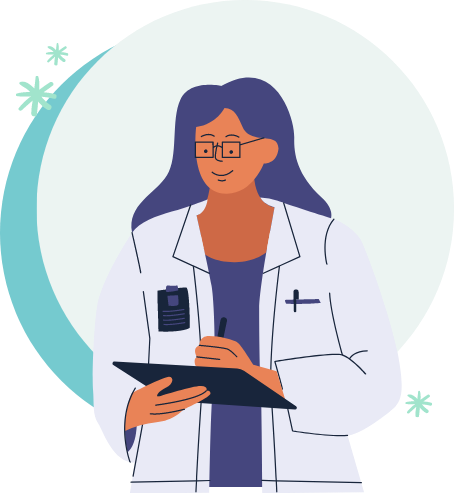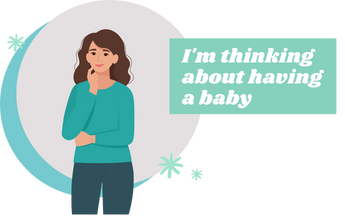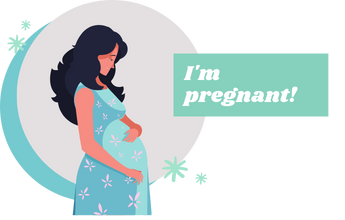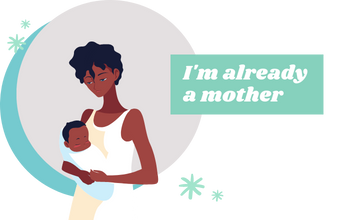Information for medical professionals
Women with epilepsy must contend with different challenges than men with epilepsy. Women need to be able to discuss issues of concern with their healthcare provider, especially during their childbearing years.
This includes being able to have a safe and satisfying sex life and, when the time is right, getting pregnant and delivering a healthy baby. That means women may have questions about medication and reducing risk when it comes to:
- contraception
- planning a pregnancy
- labour and delivery.

Not planning a family
Anti-seizure medication (ASM)
Young women with epilepsy often notice their seizure frequency changes during puberty, with hormonal changes affecting their anti-seizure medication (ASM) blood levels. Peer pressure can be at its strongest at this time and the need to be like everyone else cab tempt an adolescent to stop taking their medication.
From our experience, young women with epilepsy value being assured of how important it is for them to continue to take their ASMs as prescribed. Their dosage levels may need to be adjusted as their hormones change.
Make sure you emphasise how important it is not to suddenly stop taking medication or reducing dosage levels without first speaking with their doctor. A conversation on the possibility of seizure relapse, status epilepticus and SUDEP (sudden unexpected death in epilepsy) would also be valuable.
Contraception
When it comes to finding the most appropriate contraceptive, your advice can be really helpful to a woman with epilepsy. Share the pros and cons of different types of contraception with them and explain possible interactions with their epilepsy medication.
It’s important for any one of childbearing age who has epilepsy that she:
- avoids contraceptives that can lower ASM serum concentrations and cause break-through seizures
- is aware some ASMs may interfere with hormonal contraception and increase the risk of unplanned pregnancy – she may need to consider long-acting forms of contraception
- understands contraception is vital for women of childbearing age who are taking valproate.
We know from published reports that more than 40% of pregnancies are unplanned, so a conversation around contraception and the importance of preplanning a pregnancy can be reassuring.
Folic acid
From our experience, we know it really helps if a doctor encourages a woman with epilepsy to take a daily folic acid supplement throughout their childbearing years, whether or not they are planning a pregnancy. Your intervention is pivotal when it comes to the woman understanding how important this is.
Planning a family
Planning to have a baby can be a time of worry and concern for a woman with epilepsy. The reassuring help and support of her medical team is especially important at this time.
It’s vital you remind her not to stop taking ASMs when she finds out she is pregnant, but to seek medical advice before making any changes to medications prescribed.
Furthermore, if she knows in advance that her seizures may become stronger and more difficult to control during pregnancy, that knowledge can be really helpful.
When someone decides to try for a baby, they can be disappointed if this doesn’t happen quickly. Her medical team’s advice and reassurance can really help her avoid unnecessary stress. It’s also useful if you can make her aware of the need for emotional support and strong support networks while trying for a baby.

Caring for a newborn
Minimising baby’s exposure to ASMs in breastmilk
- If the mother takes her ASM once a day, advise her to take it at the start of the baby’s longest sleep period. This is usually after the bedtime feed.
- If she takes her ASM more than once a day, she should wait until after breastfeeding and then take it immediately. That way, the levels will be at their lowest when it comes to the next breastfeed.
- Advise her to consider pumping or using formula to supplement breastfeeding. For instance, she might use pumped milk formula for night feeds, so someone else could feed the baby while she had a chance to sleep.
- Recommend she continues to take prenatal vitamins if breastfeeding and/or planning on having another baby.
Safety in the home
From speaking with women with epilepsy who have had babies, we have learned that knowing where to source reliable information on home safety can be invaluable
Surgeries and clinics are always busy, but if you can, try to find a few minutes to talk about home safety measures. Share the links on this website, which offer excellent advice for mothers, and offer this advice too:
- Always change your baby on the floor and not on a changing table.
- Use sponge baths to clean your baby when alone and only use a baby bath when someone else is present.
- Always use the straps on any baby chair or rocker. Of course, this applies to all mothers, not just those who have epilepsy.
- When feeding your baby, try to sit on the floor. Use cushions or pillows for comfort and softness.
- Never carry your baby around while holding something hot, ironing, cooking, using a hairdryer or using any other electrical equipment that could cause harm if a seizure was to occur.
- If not getting enough sleep is a seizure trigger, try having someone help with some feeds. If breast-feeding, use a pump to express milk into a bottle.
- It’s okay to feed baby in bed but, for safety, don’t have baby in bed when sleeping.
- Keep contact details of people to call for help close by at all times.
Becoming pregnant again after baby arrives
A woman may not realise she could get pregnant again as early as three weeks after having her baby, with breastfeeding and the hormonal changes in the first few months after delivery making contraception more complicated. Of course, every pregnancy needs to be well planned for a woman with epilepsy.
A new mother will value your help in identifying the best contraception method to use when having sex in the weeks after the birth. This is especially important if the contraception method she had been using is hormonal.
Valproate: what a woman needs to know
If she is taking valproate and wants to get pregnant?
Valproate is an ASM used to treat epilepsy. It can be very effective in controlling seizures, but if a woman with epilepsy gets pregnant while on valproate, her baby is at risk of serious birth defects and developmental disorders. Taking folic acid does not reduce this risk.
While valproate is not suitable for women of childbearing age who could become pregnant, in some instances it may be the only choice where other treatment options have not worked. In these cases, very careful measures must be put in place to prevent pregnancy.
Where a woman on a medication containing valproate takes the decision to become pregnant, despite the risks, then the woman must be fully aware of, and accept, the high probability of serious birth defects in her baby.
The risks of taking valproate in pregnancy
For women who take valproate while pregnant:
- About 10 babies in every 100 will have a birth defect, compared with about two to three babies in every 100 for women in general. These include:
- Spina bifida – where the bones of the spine do not develop properly
- Face and skull malformations – including cleft lip and cleft palate, when the upper lip or bones in the face are split
- Malformations of the limbs, heart, kidney, urinary tract and sexual organs
- Hearing problems or deafness.
- Between 30 and 40 children in every 100 will have developmental problems, such as:
- Being late in learning to walk and talk
- Lower intelligence than other children of the same age
- Poor speech and language skills
- Memory problems.
- Increased risk of autism or autism spectrum disorders, and of attention deficit hyperactivity disorder (ADHD)
In February 2018, the European Medicines Agency (EMA) introduced measures to reduce the risk of exposure of unborn babies to valproate. Most EU countries have put these in place, and the UK also has a safety programme.














